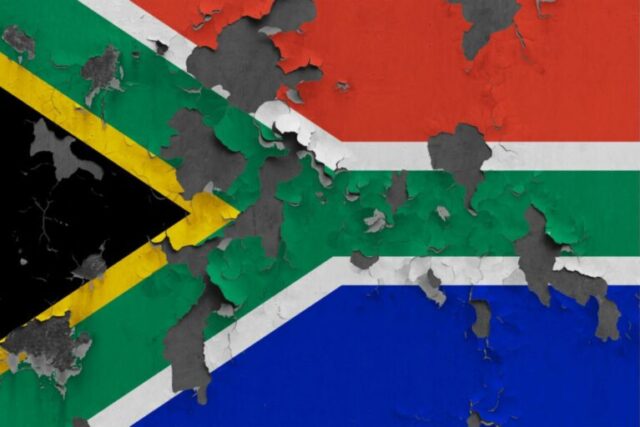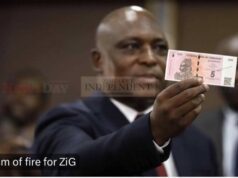South Africa is crumbling: but don’t worry, we’re still a long way from ‘Zimbabweification’ Citizen
While a stagnating economy, rising levels of unemployment, crumbling infrastructure and rolling power blackouts point to the country’s economic decline, economists said yesterday that South Africa was still a long way from “Zimbabweification”. The phrase was used years ago to describe the extent of the economic downturn in the South African economy compared to economically ailing Zimbabwe with an inflation rate of 243.8% year-on-year in December 2022. Agricultural economist Wandile Sihlobo warned of how a crumbling infrastructure has limited South Africa’s agricultural and tourism growth potential. Sihlobo said that many provincial governments and local municipalities…
While a stagnating economy, rising levels of unemployment, crumbling infrastructure and rolling power blackouts point to the country’s economic decline, economists said yesterday that South Africa was still a long way from “Zimbabweification”.
The phrase was used years ago to describe the extent of the economic downturn in the South African economy compared to economically ailing Zimbabwe with an inflation rate of 243.8% year-on-year in December 2022.
get the basics right
This, as respected agricultural economist Wandile Sihlobo has warned of how a crumbling infrastructure has limited South Africa’s agricultural and tourism growth potential.
Sihlobo said that many provincial governments and local municipalities had failed to execute the overarching national vision of economic reconstruction and development, “because they are not doing the basics”.
To get the basics right, “getting SA into better shape and easing the economic pain in rural areas needs intense attention in 2023”.
Writing on his blog, Sihlobo warned of the interconnected problems of poverty, unemployment and weak economic activity that continue to plague South Africa’s rural towns and communities, with at least 18 million people living in poverty .
Two industries battling to keep SA alive
“Two industries that could help mitigate some of these challenges: agriculture and tourism, face various constraints that limit their growth potential.
“The everyday challenge for farmers, agribusinesses and tourism entities is the dire state of the local road network, deteriorating water infrastructure and high crime levels.
“Food and drink group Clover’s decision to move its cheese production from Lichtenberg in the north west to an existing plant outside Durban in KwaZulu-Natal in 2021 – as a result of ongoing poor service delivery – in light of the real economic consequences of these Challenges brought.
“The company provided over 400 jobs in Lichtenberg and had other positive economic byproducts for the community.
“There are other well-publicized cases, including Astral in Lecqua Municipality, where a poultry producer company lost millions due to the municipality’s failure to provide a reliable supply of water and electricity.
“In the Eastern Cape, dairy producer organizations such as Amadelo Agri are struggling to transport their fresh milk to market because of the poor condition of the roads,” Sihlobo said.
zimbabwefication
Despite its challenges, economists said South Africa, whose delegation – led by President Cyril Ramaphosa – will attend the five-day World Economic Forum in Davos, Switzerland on Monday to woo investors, was “far in comparison” to Zimbabwe .
Peter Bauer, associate economics professor at the University of Johannesburg, said the term “Zimbabweification” cannot be applied to South Africa.
“We are comparing two completely different systems.
“The entirety of the political system within Zimbabwe developed into a cascade of political and economic trauma for that country.
“The structure of the South African financial and monetary system is central to the stability of the ZAR within a very turbulent global economy.
“Although South Africa has experienced challenges of corruption, political tension and socio-economic issues, it has persevered somewhat – internationally speaking,” Bauer said.
Bauer said SA has seen an increase in poverty levels, with around 18 million people living in poverty.
“With rising interest rates, due to tighter monetary policy, the cost of credit will rise and may force more households to default on loan repayments.
“This could have dire consequences for the poor and for households with low and irregular collective incomes,” Bauer said.
While the economy projects growth of about 1.6% through the end of 2022, Bauer said the impact of erratic energy supply – coupled with rising electricity costs and the overall infrastructural challenge, “will have the greatest impact on the business sector and further impact the South On economic development and outlook on the African investment climate”.
Baur: “Business confidence has dropped from 39 to 38. However, the Absa Purchasing Managers’ Index rose to 53.1 points.
“We also see growth in retail sales.
“Businesses create job opportunities, but with growing uncertainty, investment decisions by businesses may be impacted.
“This will reduce the additional stress placed on households. ,
Also read: SA collapses as power output signals economic activity
Comparing SA to Zim is ‘lazy’
Dick Forslund, of the Center for Alternative Information and Development, described the “Zimbabweification of SA” as “a lazy concept”.
“Zimbabwe is very bad economically and has another history.
“Even if we are dealing with state plunder and massive corporate profit transfers in both countries, we should not use a lazy concept,” Forslund argued.
Society, he said, required massive public sector intervention and an employment program funded by:
Half a trillion rand in the state pension fund – risk on the stock market.
Shutting down public service and infrastructure projects to stop 95% of all tenders, procurement and “the system of corrupt middlemen that has destroyed the ruling party”.
Much higher tax rates on the middle class, the wealthy and large corporations, with more resources to the SA Revenue Service to “stop tax dodging – to restore the taxation on the wealthy lifestyle of 20 years ago”.
Read also: Eskom to implement phase 6 of load shedding at night until further notice
Forslund said the country needed a “battery of reforms in a socialist, pro-poor and redistributive direction”.
Political and policy analyst Dr Nkosikhulule Nyembezi said South Africa still had “the potential to attract investment in various sectors of the economy”.
Nyembezi said, “Even the beleaguered Eskom and crumbling infrastructure present investment opportunities that can deliver attractive returns – provided the government does not insist on interference in decisions to run the business efficiently.”
“South Africa’s leaders in Davos can still successfully attract investors – albeit on less favorable terms.
“Ultimately, SA continues to benefit from favorable external conditions, such as periodic buoyancy in commodity prices and a strong currency,” Nyembezi said








